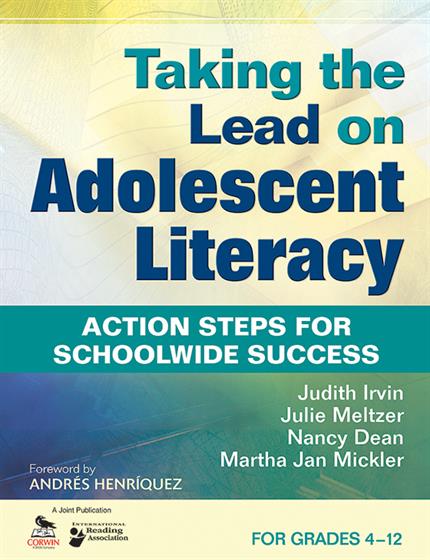
Hands-on, Practical Guidance for Educators
From math,
literacy, equity, multilingual learners, and SEL, to assessment, school counseling,
and education leadership, our books are research-based and authored by experts
on topics most relevant to what educators are facing today.
Taking the Lead on Adolescent Literacy
Foreword by Andrés Henríquez
A systemic and sustainable approach for improving adolescent literacy and learning!
Ideal for school leaders charged with improving adolescent literacy, this resource offers a comprehensive planning process for developing, implementing, monitoring, and sustaining a successful literacy initiative for Grades 4–12. A user-friendly, five-stage approach builds on the existing capacities of a school or district and focuses on six rubrics that can be implemented at every stage to help ensure long-term success:
- Student motivation, engagement, and achievement
- Literacy across content areas
- Literacy interventions
- Literacy-rich policies, environment, and culture
- Parent/community involvement
- District support of school-based efforts
- Grade Level: PreK-12, Elementary, Secondary
- ISBN: 9781412979801
- Published By: Corwin
- Year: 2010
- Page Count: 248
- Publication date: May 02, 2010
Price: $42.95
For Instructors
When you select 'request review copy', you will be redirected to Sage Publishing (our parent site) to process your request.
Description
"This rich resource walks middle and high school literacy leaders through a comprehensive process for conceptualizing, initiating, and, most important, sustaining a schoolwide literacy learning program. The authors clearly know teachers and schools, and their reality-tested tools will prove invaluable in guiding and supporting middle and high school literacy leaders."
—Doug Buehl
Author, Classroom Strategies for Interactive Learning
A systemic and sustainable approach for improving adolescent literacy and learning!
Taking the Lead on Adolescent Literacy provides educational leaders with a user-friendly and comprehensive planning process for developing a new literacy initiative—or for dramatically enhancing a current plan--that has the power not only to raise student performance levels but also to positively impact graduation rates, employability, and higher education success.
Using a five-stage framework that has been field-tested nationwide for more than a decade, the authors provide an array of resources to guide in-depth planning, implementation, and monitoring to ensure sustained results, supported by examples from literacy-rich schools, checklists and assessments, and a glossary of terms. Each stage in the process builds upon a school or district's existing capacities and focuses on six detailed rubrics that can be implemented at every stage to help ensure long-term success:
- Student motivation and engagement
- Literacy across the content areas
- Literacy interventions
- Literacy-rich environment, policies, and culture
- Parent and community involvement
- District support of school-based efforts
Helping educators build the critical skills in students for communicating and making meaning within an increasingly complex world, this book shows how a sustained focus on literacy can serve as a powerful lever for school improvement.
Key features
The text features:
- A 5-stage process for conducting a customized, schoolwide literacy improvement effort that suits the needs of a particular student body and builds upon a school's existing capacities
- A set of 6 detailed rubrics that describe the necessary elements of an effective schoolwide literacy initiative and can be used at every stage of the process:
- Student motivation, engagement, and achievement
- Literacy across the content areas
- Literacy interventions
- Literacy-rich environment, policies, and culture
- Parent and community involvement
- District support of school-based literacy improvement efforts
- A section on districtwide change and strategies that support administrators as literacy leaders
Author(s)

Judith Irvin
She has written and edited numerous books, chapters, and articles on adolescent literacy—most notably Reading and the High School Student: Strategies to Enhance Literacy (with Douglas Buehl and Ronald Klemp, 2007), Strategies for Enhancing Literacy and Learning in Middle School Content Area Classrooms (with Douglas Buehl and Barbara Radcliffe, 2007), and Teaching Middle School Reading (with James Rycik, 2005).
Judith recently completed two books as a result of a project funded by Carnegie Corporation of New York: Taking Action on Adolescent Literacy: An Implementation Guide for School Leaders (with Julie Meltzer and Melinda Dukes, ASCD, 2007) and Meeting the Challenge of Adolescent Literacy: Practical Ideas for Literacy Leaders (with Julie Meltzer, Martha Jan Mickler, Melvina Phillips, and Nancy Dean, 2009). She is a speaker and consultant to school systems and professional organizations throughout the nation. Judith spent eight years as a middle and high school social studies and reading teacher.

Julie Meltzer
districts throughout the country.

Nancy Dean
Nancy is the author of Voice Lessons: Classroom Activities to Teach Diction, Detail, Imagery, Syntax, and Tone (2000); Discovering Voice: Voice Lessons for Middle and High School (2006); and the Writing Intervention Kit for High School (2008). She is also coauthor (with Candace Harper) of Succeeding in Reading: A Complete Cross-Age Tutoring Program (2006), and Meeting the Challenge in Adolescent Literacy: Practical Ideas for Literacy Leaders (with Judith Irvin, Julie Meltzer, Martha Jan Mickler, and Melvina Phillips, 2009).

Martha Jan Mickler
She has held a variety of leadership positions in education, including Supervisor of Secondary Reading (Pinellas County, Florida); Principal, Fairyland Elementary School (Walker County, Georgia); Supervisor of English and World Languages and Director of Teaching and Learning (Chattanooga Public Schools,Tennessee); and Director of Music Therapy (New Jersey Neuropsychiatric Institute, Princeton, New Jersey). She was also a resource teacher at Fairyland School and a piano instructor and performing artist for Cadek Conservatory (Chattanooga, Tennessee). Martha Jan has been active in many professional organizations, including the National Council of Teachers, serving as President of theTennessee Council of Teachers from 1997 to 1999. She serves on the Editorial Review Board for the Journal of Adolescent and Adult Literacy and has coauthored a book on literacy leadership: Meeting the Challenge of Adolescent Literacy: Practical Ideas for School Leaders (with Judith Irvin, Julie Meltzer, Melvina Phillips, and Nancy Dean, 2009). Her published articles have appeared inmany periodicals, including the Journal of Special Education, Classroom Leadership, Spelling Progress Quarterly, and Computers, Reading, and Language Arts.
Table of Contents
Foreword by Andres Henriquez
Acknowledgments
About the Authors
Part I. The Model, Process, and Rubrics
Rationale for a Schoolwide Focus on Literacy
Why Focus on Literacy?
How the Literacy Leadership Process Was Developed
The Five-Stage Literacy Leadership Process
How to Use the Literacy Leadership Process
Introduction: The Literacy Action Rubrics
Description of the Rubrics
Using the Literacy Action Rubrics
The Literacy Action Rubrics
Part II. Schoolwide Change in Five Stages
1. Stage 1: Get Ready
Step 1: Build an Effective Literacy Leadership Team
Step 2: Create a Vision of a Literacy-Rich School
Step 3: Use Data to Establish the Need for Literacy Improvement
Next Steps
2. Stage 2: Assess
Step 1: Identify School Strengths
Step 2: Summarize Key Messages From Your School Data
Step 3: Assess Current School Implementation Using the Literacy Action Rubrics
Step 4: Draft Literacy Action Goals
Next Steps
3. Stage 3: Plan
Step 1: Develop an Implementation Map for Each Literacy Action Goal
Step 2: Solicit Feedback From the School Community
Step 3: Revise Literacy Action Goal Statements and Implementation Maps
Step 4: Publish the Formal Literacy Action Plan
Next Steps
4. Stage 4: Implement
Step 1: Organize for Action
Step 2: Monitor and Troubleshoot Implementation
Step 3: Monitor Progress Toward Goals
Step 4: Plan How to Sustain Momentum
Next Steps
5. Stage 5: Sustain
Step 1: Summarize Progress Toward Goals
Step 2: Revise Implementation Maps
Step 3: Analyze Success as a Literacy Leadership Team
Step 4: Plan How to Sustain Momentum
Next Steps
Part III. Supporting School and District Administrators as Literacy Leaders
6. The Principal's Role
Support Literacy Leaders
The Five Action Points of the Taking Action Literacy Leadership Model
7. District Support
Communicate That Literacy Is a Priority
Provide Professional Development
Provide Specific Types of Fiscal Support
Establish Uniform Policies and Procedures Across the District
Use Data to Improve Instruction and Monitor Program Effectiveness
Develop and Implement a District Literacy Action Plan
Use the Five Action Points of the Taking Action Literacy Leadership Model
Review the District Plan to Ensure Alignment With State Planning and Advocacy
Resources
Resource A. School Vignettes
Resource B: Tools to Use When Implementing the Five-Stage Process
Resource C: Examples of Each Rubric Component in Action
Resource D: High School Case Study
Resource E: Matrix of Resources Available in Taking Action on Adolescent Literacy and Meeting the Challenge of Adolescent Literacy
Resource F: Glossary of Terms
References
Index
Reviews
"The connections regarding best practice research from multiple fields—differentiation, professional development, curriculum mapping, 21st-century literacy, assessment, and instructional strategies—are critical and very well done. These connections are made in a professional, understandable way with theories and classroom applications articulated across grade levels and in many formats: scoring guides, prose, questions, vignettes, case studies, and graphics."Darlene Castelli, Literacy Coach/Reading Specialist
Clayton High School, MO
"Wow! This book gives school and district leaders and teams the what, why, and how to do the rocket science work of getting every student to read and write at grade level or above. Principals and literacy teams no longer need to be stuck in the 'We don’t know what to do next' world of frustration."Bess Scott, Director of Elementary Education
Lincoln Public Schools, NE
"This rich resource walks middle and high school literacy leaders through a comprehensive process for conceptualizing, initiating, and, most important, sustaining a schoolwide literacy learning program. The authors clearly know teachers and schools, and their reality-tested tools will prove invaluable in guiding and supporting middle and high school literacy leaders."Doug Buehl, Author, Classroom Strategies for Interactive Learning
"The Literacy Project is a systemic process that guarantees all students access to superior instructional strategies."Kathleen P. Norton, Principal
Arvada High School, CO
"This literacy project changed the culture and focus of our school in less than a year. Following the process outlined in this book allowed our literacy team to personalize the project to our school and needs. Our team presented our project to our staff in August and our teachers have implemented it faithfully. Our students know the slogan and are excited about the project. The literacy team has kept the excitement high for the year."Trip Sargent, Principal
North Arvada Middle School, CO
"I have seen numerous educational initiatives come and go in my forty-some years working with schools, but nothing has been as important, relevant, or long lasting as adolescent literacy. Schools that have principals and teachers who have stayed the course with embedded literacy strategies across the curriculum, that focus on literacy rich culture and structures in their buildings, that have students using literacy strategies on their own, and that have staff and students reading and sharing, are the schools that make significant gains in their educational achievement."Betty A. Jordan, Director
Washington County Consortium, Machias, ME
"The most beneficial aspect of the literacy action planning process was providing training and asking for input from teachers from the very beginning. Literacy support team members were able to reflect on the unique and specific strengths and needs of their buildings and utilize this information to develop a practical implementation plan. The time spent working together on the literacy action plan helped build community and foster a sense of ownership in the change process."Lisa White, District ELA Coordinator
Plymouth Public Schools, MA
"In each chapter I found honest descriptions of the tough issues faced by schools trying to focus on literacy across the content areas. More important, the chapters are full of guidelines and practical suggestions for dealing with those challenges. The implementation maps and the rubrics that help school literacy teams diagnose issues, establish goals, monitor implementation, and sustain changes are particularly valuable resources. The authors know that change requires a systems approach with all levels of school and community involved over an extended timeframe. I heartily recommend this as a very useful tool for schools wanting to implement a schoolwide commitment to literacy."Donna Ogle, Professor of Reading and Language
National-Louis University
“The five-stage literacy leadership process in the book provided my principals and teachers with an easy-to-follow, researched-based guide to develop a successful literacy program within their schools.”Jerryelyn L. Jones, Chief Area Officer
Area 24, Chicago Public Schools, IL
"As educators living in this world of high-stakes accountability, we need a way to focus our activities to be sure that our hard work is well spent. The literacy action planning process developed by Irvin and her colleagues has helped several schools in our district realistically assess their strengths and opportunities for improvement and develop concrete action plans for schoolwide literacy improvement."Connie Kolosey, Supervisor of Secondary Reading
Pinellas County Schools, FL
For Instructors
When you select 'request review copy', you will be redirected to Sage Publishing (our parent site) to process your request.

